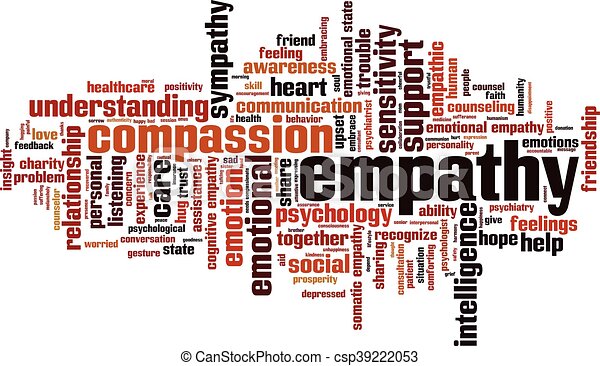ASSERTIVE COMMUNICATION: EMOTIONS & EMPATHY
Expressing Emotions and Empathy is the second of the Assertive Communication Skills series. They complete the self-defining skills along with requests and refusals covered earlier. Self-defining means they help us express our individuality. Expressing your emotions and using empathy are important assertive skills for healthy relationships.
Emotions are part of what makes us human. It is unhealthy for some emotions to be taboo. Though we’ve made progress, implicit bias still exists because of lessons learned in childhood. Males often feel shamed when they show vulnerable emotions such as sadness or hurt. Females often experience rejection when they express anger. In addition, males often lack empathy skills and may feel that expressing it makes them weaker. Both these skills lead to healthier emotional functioning and relationships.
Expressing Emotions

Emotions are not right or wrong, they are just what we experience. What we feel is affected by our beliefs and prior events. If we learn something new or circumstances change, our feelings often do as well. Taking ownership of our emotions empowers us to stand up for ourselves and not be the victim of others’ behavior. We have the right to express how we feel if we do it in respectful ways.
Expressing our emotions enhances our connection with others. It’s self-evident that expressing pleasant feelings increases warmth and goodwill. Communicating unpleasant feelings also can enhance connection if done assertively. Expressing them shows you care enough about the relationship to want it to continue instead of ending it. It permits change to happen, instead of resentment or hurt festering.
However, discomfort in expressing negative emotions often occurs for two reasons. First, many do not learn how to do it assertively, so hold back out of fear of being aggressive. Hopefully, this blog helps with that. Second, we may have learned to take responsibility for others’ feelings and hold back out of worry they will feel hurt or disappointed. Believing in the right to be assertive involves discerning what our responsibilities are to ourselves as well as to others.
Expressing emotions can also be helpful at work or with professionals. However, be conservative with expressing vulnerable emotions because of the power differences that often exist. It is often appropriate to use emotions like surprise, confusion, uncertainty, or puzzlement instead of fear, anger, or hurt.
Assertive Communication Barriers
- If you’re in an abusive relationship, this skill increases your emotional vulnerability to the abuser. Do not expect them to care about your feelings. Sometimes, you may want to express your emotion anyway because it feels empowering. If so, do it for that reason and shield yourself from internalizing what they say or do. The abuse reflects on them, not you.
- Expressing unpleasant emotions assertively, such as anger or fear, can protect relationships when we’re not blaming our emotions on them. When we hold back emotions, it often results in what is called a BUBU, “build-up, blow-up.” Tension builds, until it explodes into aggressive words instead of assertive, damaging the relationship. Also, you lose your power, since it shifts the conversation to how the other person feels about your aggression instead of the issue you were concerned about.
- Many people fear their anger because they experienced it paired with abuse. Emotions and behavior are separate. We feel emotions; we choose how we express them. Anger can be an empowering emotion, instead of a destructive one. Start by sharing your anger with safe people and give yourself credit for the courage that takes.
Expressing Empathy

Empathy communicates your understanding of another person from their point of view. It demonstrates that you are invested in knowing them, which helps them to feel accepted. This increases their willingness to talk and promotes goodwill between you. We can use empathy regardless of whether we agree or disagree. However, disagreement is a separate skill and should come after empathy.
Do not use empathy if you are being abused. There are other skills covered later that are more appropriate. Even professionals need to be cautious using empathy with those who use abuse. These individuals usually interpret empathy as agreement and feel confirmed in how they behaved. If empathy is appropriate, it’s important to be clear about what you’re empathetic about and name any abusive behavior. Example: “It sounds like you felt scared your partner would leave you.” If your client confirms this, you say, “We will work on other ways of managing your fear. What you did was abusive, and it makes it even more likely you’ll lose her.”
Assertive Communication Barriers
- If you don’t agree with what the person is expressing, you may think you can’t be empathetic. Demonstrating understanding is the goal in non-abusive interactions. We may be sympathetic to the person’s feelings. Other times, we disagree, but still want to make sure we understand them. We may offer an alternative viewpoint after expressing empathy, but at other times, we may deem it isn’t an appropriate time for that. For instance, if someone is in the initial stages of grief, they may not be ready to hear encouragement that it won’t last.
- You may feel empathy requires giving up your feelings. That would be counter-productive for yourself as well as the other person. If you have a strong emotion that interferes with hearing them, be honest and say you regret you aren’t in a good place to talk about this.
- You may think that saying something like, “I understand how you’re feeling” is empathy. While it’s meant to comfort, it does not demonstrate knowledge of what they feel and why, so doesn’t offer as strong a connection with them.
Enhance Your Assertive Skills
Download Self-defining Skills: Expressing Emotions and Empathy. Use them to improve your skill. Having a buddy to practice with is ideal.
Expressing emotions and giving empathy feels easier for some, but others experience feeling vulnerable because of prior history. Continue to work on believing you have the right to be assertive. There are assertive beliefs that permit expressing emotions and empathy on the worksheet. Seek help for any difficulties in using these skills.

